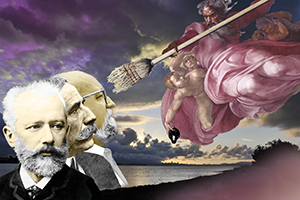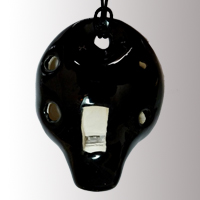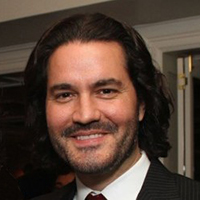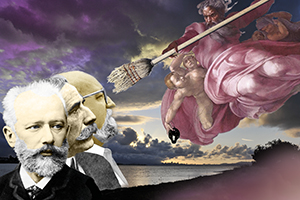
“Sweeping Emotions,” the theme advertised for last Saturday’s Santa Rosa Symphony concert, can cover a lot of ground. It’s an obvious choice for music about Cinderella and her feelings about housework, but, luckily for attendees, more profound applications of the theme were to be swept through Weill Hall by Music Director Bruno Ferrandis and his band, courtesy of composers Krzysztof Penderecki, Edward Elgar, and Peter Ilyich Tchaikovsky.
The first was the most transfiguring, and not the most popular. Als Jakob erwachte (The awakening of Jacob) is Penderecki’s 6-minute evocation of the sweeping awe and fear felt by Jacob (Genesis 28:17) after experiencing a dream in which God spoke to him from the top of a ladder (or stairway, or escalator). He realized the place where he happened to snooze was the gateway to heaven, anointed it “Bethel,” and hightailed it out of there.
Muddy chords, tremolos, and glissandos do their usual scary stuff in Awakening, but what makes the piece a standout is Penderecki’s innovation of adding a chorus of ocarinas, vessel flutes that go back maybe as far as Jacob himself. Just for the concert, local artist Ruthie Bitton custom-fired 12 of them for the orchestra with an ebony glaze, in keeping with the seriousness of the occasion.

Their sound was certainly a stairway, or a windpipe, to someplace unearthly: The 1974 piece was used six years after its premiere as a soundtrack in Stanley Kubrick’s movie The Shining. I thought the piece was terrific, and very well played, but most of the patrons I talked to didn’t like it because of its dissonance. That Steven Ledbetter’s program notes call the music a move to neo-Romanticism is a reach that only Jacob’s ladder can bridge.
Next came Edward Elgar’s Cello Concerto (1919), with Virginia-born Zuill Bailey as soloist. I reviewed this concerto twice last year, with two different soloists — popular with cellists — and both were excellent. But this third time is the charm, if you can associate that word with this very sad piece, written right after the war that destroyed so much that Elgar believed in. Bailey’s was the best rendition I’ve heard this century. That he had all the technical chops was an essential, but he also exquisitely conveyed, both in musical and bodily expression, the pain of loss that permeates the slow movement.
Bailey also exquisitely conveyed, both in musical and bodily expression, the pain of loss.
Bailey and Ferrandis were a great team together: They had the elusive knack of getting the tempos just right and putting in the rubatos where they belong — a standard stumbling block for so many non-British performers. Furthermore, they took advantage of Weill’s terrific acoustics at low volumes by producing the faintest of pianissimos where required and thus expanding the variety of dynamic range.
The new hall’s only aural drawback where I sat in Row P was that the fortissimo passages didn’t resonate as much as they should have, dissipating too quickly. This was most apparent in the tuttis of the first movement, with its “infinite tune” that, like the years of trench warfare, never seems to end.
Ferrandis didn’t let the orchestra drown the cello at any point, and put in nicely spiky punctuations where Elgar gave the players brief moments to shine. To put the frosting on the interpretive cake, the orchestra, including the brass section, played flawlessly. Bravo!

After intermission came Tchaikovsky’s manic-depressive Sixth Symphony. Tchaikovsky makes an interesting comparison with Elgar. Both are highly emotional, but the former is heart-on-sleeve while the latter is heart-under-stiff-upper-lip. Both are also highly repetitive, but Tchaikovsky prefers literal repetitions in pairs while Elgar explores sequences that cover a wider range of harmonies. To use one word for comparison, it’s subtlety.
Ferrandis did a good job of presenting the music. The general tempos were right and the expression was appropriately heartfelt. Unlike the way he handled the Elgar, Ferrandis tended to accelerate a bit at climaxes where he should let them soak in a bit. I did like the way he began the development section of the first movement with a jagged bolt of lightning. Ferrandis made no attempt to stop the audience from applauding at the end of the martial third movement; this made the desolate finale sound a little more like an afterthought than an innovation. (However, if you really want to stop such applause, you should request it beforehand: Audiences can’t help themselves, thanks to the brilliance of Tchaikovsky’s endings of the penultimate movements in his Fifth and Sixth Symphonies.)
They took advantage of Weill’s terrific acoustics at low volumes by producing the faintest of pianissimos where required.
Unlike its performance in the Elgar concerto, the brass section was not uniformly excellent. I loved the trombone work, but the horns had difficulty in synchronizing a tricky passage of octave eighth notes toward the end of the second movement. In general, though, I was very pleased, and so was the audience. Among so many emotions in this concert, one of my biggest was “Thank God they swept themselves out of the horrible acoustics of their previous venue!” Compared to that, Weill Hall is a Bethel, no question.

